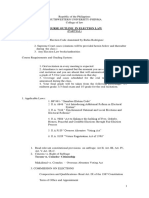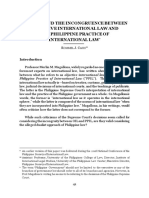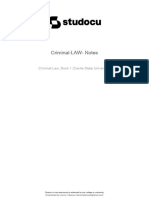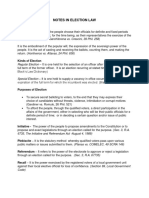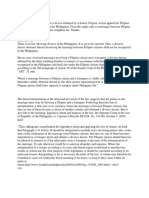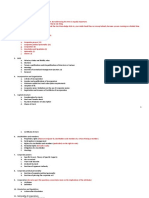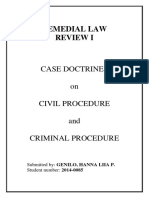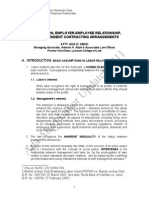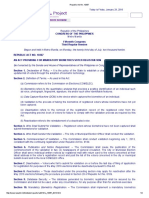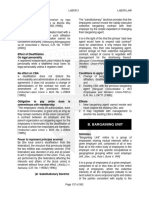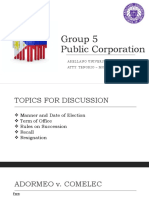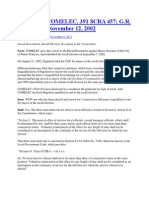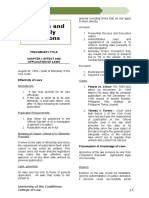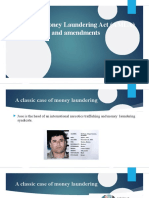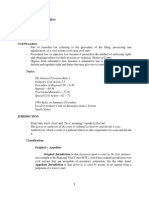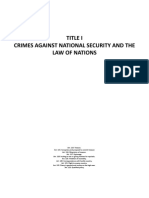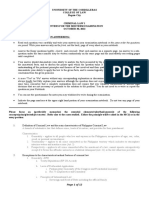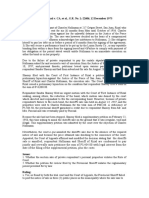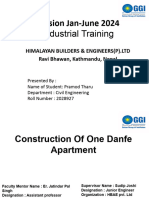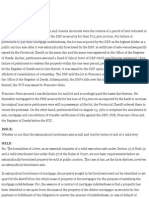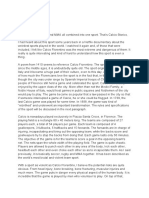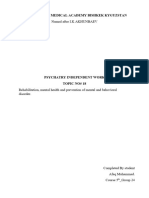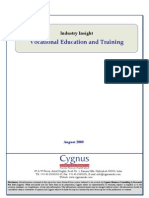BRIEF SUMMARY OF CASES ON THE 3 CONSECUTIVE TERM RULE
MAYOR ABELARDO ABUNDO., SR. VS. COMELEC & ERNESTO VEGA,
G.R. No. 201716, JANUARY 08, 2013
In 2001, he won as Mayor. In 2004, his opponent was initially proclaimed winner but on Protest, he was declared
Mayor in May, 2006 so he was able to serve 1 year of his supposed 3-year term. In 2007, he won again as Mayor.
May he run for Mayor in the May 2010 elections without violating the 3-consecutive term rule?Yes because his
failure to serve the 1 2 years is involuntary thereby not being able to complete his 2004-2007 term because of the
st
wrongful proclamation of his opponent who was the one who served the 1 2 years of the 2004-2007 term.
st
To constitute a disqualification to run for an elective local office pursuant to the aforequoted constitutional and
statutory provisions, the following requisites must concur.
(1) that the official concerned has been elected for three consecutive
terms in the same local government post; and
(2) that he has fully served three consecutive terms.
BY OPERATION OF LAW
BORJA VS. COMELEC (2008)
When the supposed incumbent refuses to assume office, fails to qualify, dies, is removed from
office, voluntarily resigns or is otherwise permanently incapacitated to discharge the functions of his
office.
In Borja, Jr., Jose T. Capco, Jr. (Capco) was elected vice-mayor of Pateros on January 18, 1988 for a term ending
June 30, 1992. On September 2, 1989, Capco became mayor, by operation of law, upon the death of the incumbent mayor,
Cesar Borja. Capco was then elected and served as mayor for terms 1992-1995 and 1995-1998. When Capco expressed
his intention to run again for the mayoralty position during the 1998 elections, Benjamin U. Borja, Jr., who was then also a
candidate for mayor, sought Capco’s disqualification for violation of the three-term limit rule.
Finding for Capco, the Court held that for the disqualification rule to apply, “it is not enough that an
individual has served three consecutive terms in an elective local office, he must also have
been elected to the same position for the same number of times before the disqualification
can apply.” There was, the Court ruled, no violation of the three-term limit, for Capco “was not elected to the office of the
mayor in the first term but simply found himself thrust into it by operation of law ” when a permanent vacancy occurred in
that office.
� MONTEBON VS. COMELEC
Montebon had been elected for three consecutive terms as municipal councilor of Tuburan, Cebu in 1998-2001,
2001-2004, and 2004-2007. However, in January 2004, or during his second term, Montebon succeeded and assumed the
position of vice-mayor of Tuburan when the incumbent vice-mayor retired. When Montebon filed his certificate
of candidacy again as municipal councilor, a petition for disqualification was filed against him based on the three-term limit
rule. The Court ruled that Montebon’s assumption of office as vice-mayor in January 2004 was an interruption of his
continuity of service as councilor. The Court emphasized that succession in local government office is by
operation of law and as such, it is aninvoluntary severance from office . Since the law no less
allowed Montebon to vacate his post as councilor in order to assume office as vice mayor, his occupation of the higher
office cannot, without more, be deemed as a voluntary renunciation of his position as councilor.
Recall Election
ADORMEO VS. COMELEC (2002)
In Adormeo, Ramon Talaga, Jr. (Talaga) was elected and served as mayor of Lucena City during terms 1992-1995
and 1995-1998. During the 1998 elections, Talaga lost to Bernard G. Tagarao. However, before Tagarao’s 1998-2001 term
ended, a recall election was conducted in May 2000 wherein Talaga won and served the unexpired term of Tagarao until
June 2001. When Talaga ran for mayor in 2001, his candidacy was challenged on the ground he had already served as
mayor for three consecutive terms for violation of the three term-limit rule. The Court held therein that the remainder of
Tagarao’s term after the recall election during which Talaga served as mayor should not be
considered for purposes of applying the three-term limit rule . The Court emphasized that the
continuity of Talaga’s mayorship was disrupted by his defeat during the 1998 elections.
SOCRATES VS. COMELEC (2002)
Hagedorn had been elected and served as mayor of Puerto Princesa City for three consecutive terms: in 1992-
1995, 1995-1998 and 1998-2001.
Obviously aware of the three-term limit principle, Hagedorn opted not to vie for the same mayoralty
position in the 2001 elections, in which Socrates ran and eventually won . However, midway into
his term, Socrates faced recall proceedings and in the recall election held, Hagedorn run for the former’s unexpired term as
mayor. Socrates sought Hagedorn’s disqualification underthe three-term limit rule. In upholding Hagedorn’s candidacy to run
in the recall election, the Court ruled:
x x x After Hagedorn ceased to be mayor on June 30, 2001, he became a private citizen until the
recall election of September 24, 2002 when he won by 3,018 votes over his closest opponent,
Socrates. From June 30, 2001 until the recall election on September 24, 2002, the mayor of Puerto
Princesa was Socrates. During the same period, Hagedorn was simply a private citizen. This period
� is clearly an interruption in the continuity of Hagedorn’s service as mayor, not because of his voluntary
renunciation, but because of a legal prohibition.
The prohibited election refers to the next regular election for the same office following
the end of the third consecutive term [and, hence], [a]ny subsequent election, like recall
election, is no longer covered x x x.”
NOTE THE CASE OF SENATOR DRILON
1995-2001 THEN 2001-2007. He cannot run for Senator in the election in May, 2007. Can he
run for Senator in the election of May 2010 when only 3 years lapsed and the term of a
Senator is 6 years?
Yes because the prohibition applies only to the next regular election after the expiration of
his 2-year term. It does not apply to next after that even though only 3 years lapsed.
CONVERSION OF A MUNICIPALITY INTO A CITY
LATASA V. COMMISSION ON ELECTIONS (2003)
The conversion of a municipality into a city does not constitute an
interruption of the incumbent official’s continuity of service.
Arsenio A. Latasa was elected and served as mayor of the Municipality of Digos, Davao del Sur for terms 1992-
1995, 1995-1998, and 1998-2001. During his third term, Digos was converted into a component city, with the
corresponding cityhood law providing the holdover of elective officials . When Latasa filed his
certificate of candidacy as mayor for the 2001 elections, the Court declared Latasa asdisqualified to run as mayor of Digos
City for violation of the three-term limit rule on the basis of the following ratiocination:
This Court believes that (Latasa) did involuntarily relinquish hisoffice as municipal mayor since the said
office has been deemed abolished due to the conversion. However, the very instant he vacated his
office as municipal mayor, he also assumed office as city mayor. Unlike in Lonzanida, where petitioner
therein, for even just a short period of time, stepped down from office, petitioner Latasa never ceased from
acting as chief executive of the local government unit. He never ceased from discharging his duties and
responsibilities as chief executive of Digos. AND THE ELECTORATES ARE THE SAME.
Period of Preventive Suspension
Aldovino Jr., VS. COMELEC (2009)
� The period during which a local elected official is under preventivesuspension cannot be considered as an
interruption of the continuity of his service because the suspended official continues to stay in office
although he is barred from exercising the functions and prerogatives of the office within
the suspension period. The best indicator of the suspended official’s continuity in office is
the absence of a permanent replacement and the lack of the authority to appoint one since no vacancy exists.
Election Protest
LONZANIDA VS. COMELEC (1999)
Romeo Lonzanida was elected and had served as municipal mayor of San Antonio, Zambales in terms 1989-1992,
1992-1995 and 1995-1998. However, his proclamation relative to the 1995 election was protested and was
eventually declared by the RTC and then by COMELEC null and void on the ground of failure of elections. On February
27, 1998, or about three months before the May 1998 elections, Lonzanida vacated the mayoralty post in light of a
COMELEC order and writ of execution it issued. Lonzanida’s opponent assumed office for the remainder of the term. In the
May 1998 elections, Lonzanida again filed his certificate of candidacy. His opponent, Efren Muli, filed a petition for
disqualification on the ground that Lonzanida had already served three consecutive terms in the same post. The Court,
citing Borja Jr., reiterated the two (2) conditions which must concur for the three-term limit to apply: “1) that the official
concerned has been elected for three consecutive termsin the same local government post
and 2) that he has fully served three consecutive terms.”
ONG V. ALEGRE
Francis Ong (Ong) was elected and served as mayor of San Vicente, Camarines Norte for terms 1995-1998, 1998-
2001, and 2001- 2004. During the 1998 mayoralty elections, or during his supposed second term, the COMELEC nullified
Ong’s proclamation on the postulate that Ong lost during the 1998 elections. However, the COMELEC’s decision
became final and executory on July 4, 2001, when Ong had fully served the 1998- 2001
mayoralty termand was in fact already starting to serve the 2001-2004 term as mayor-elect of the municipality of San
Vicente.
In 2004, Ong filed his certificate of candidacy for the same position as mayor SINCE HE CLAIMED THAT HE WAS
NOT ELECTED FOR 3 CONSECUTIVE TERMS BECAUSE HE LOST DURING HIS 2 TERM SO THE 1 REQUISIE IS ND ST
NOT PRESENT.
The Court held that his assumption of office as mayor for the term 1998-2001 constitutes “service for the full term”
and hence, should be counted for purposes of the three term limit rule—EVEN IF HE LOST IN THAT ELECTION.
� The Court noted that the COMELEC decision which declared Ong as NOT HAVING WON THE 1998
ELECTIONS was “WITHOUT PRACTICAL AND LEGAL USE AND VALUE” PROMULGATED AS IT
WAS AFTER THE CONTESTED TERM HAS EXPIRED. The Court further reasoned:
The absurdity and the deleterious effect of a contrary view is not hard to discern. Such contrary view would mean that
Alegre ---his opponent---would – under the three-term rule - be considered as having served a term by virtue of a
veritably meaningless electoral protest ruling, when another actually served such term pursuant to a proclamation made in
due course after an election.
RIVERA III V. COMMISSION ON ELECTIONS AND DEE V. MORALES.
Morales was elected mayor of Mabalacat, Pampanga for the following consecutive terms: 1995-1998, 1998-2001
and 2001-2004. HE WON AGAIN FOR THE 2004-2007 TERM. IS THAT ALLOWED?
In relation to the 2004 elections, Morales again ran as mayor of the same town, emerged
as garnering the majority votes and was proclaimed elective mayor for term commencing
July 1, 2004 to June 30, 2007.
Morales averred that his supposed 1998- 2001 term cannot be considered against him, for, although he was
proclaimed by the Mabalacat board of canvassers as elected mayor vis-à-vis the 1998 elections and discharged the duties
of mayor until June 30, 2001, his proclamation was later nullified by the RTC of Angeles City and his closest rival,
Anthony Dee, proclaimed the duly elected mayor. Pursuing his point, Morales parlayed the idea that he only served as a
mere caretaker. DISQUALIFIED LIKE ONG SINCE HE FULLY SERVED THE 1998-2001 TERM.
DIZON V. COMMISSION ON ELECTIONS (2009)
CONSIDERING THE DECISION IN RIVERA VS. COMELEC, MAY MORALES RUN AGAIN
FOR MAYOR IN THE MAY, 2007 ELECTIONS?
YES. Involuntary severance from office for any length of time short of the full term provided by law amounts to an
interruption of continuity of service. Our decision in the Rivera case was promulgated on 9 May 2007 and was effective
immediately. The next day, Morales notified the vice mayor’s office of our decision. The vice mayor assumed the office of
the mayor from 17 May 2007 up to 30 June 2007. The assumption by the vice mayor of the office of the mayor, no
matter how short it may seem to Dizon, interrupted Morales’ continuity of service . Thus, Morales didnot hold office for
the full term of 1 July 2004 to 30 June 2007.
